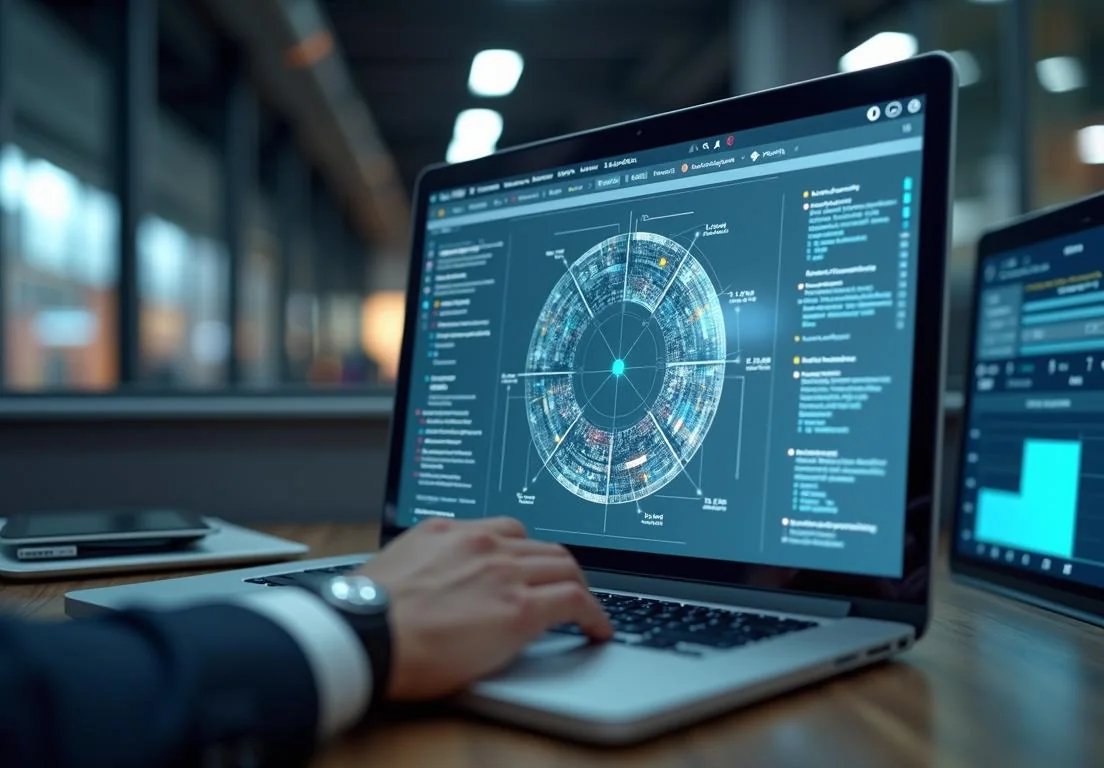In the fast-paced world of tech, the role of a software development senior analyst stands out as both crucial and multifaceted. These professionals are not just number crunchers or code writers; they’re the architects of innovative solutions that drive business success.
A software development senior analyst designs and implements software requirements, collaborates with development teams, and ensures project objectives align with technical capabilities and business goals. But wait, there’s a lot more to this role than meets the eye—let’s uncover the layers of responsibilities and skills that make a senior analyst indispensable in the tech landscape.
Key Takeaways:
- A software development senior analyst bridges the gap between technical teams and business stakeholders through effective communication and collaboration.
- They play a key role in requirements gathering and design analysis, ensuring that software solutions align with business goals while managing project timelines and budgets.
- Mastery of tools and methodologies, particularly Agile, enables them to adapt to challenges and drive efficient, innovative software development projects.
Responsibilities of a Software Development Senior Analyst
A Software Development Senior Analyst wears multiple hats, balancing technical expertise with keen analytical skills. At the core, the role involves requirements gathering; this means collaborating with stakeholders to pinpoint what they need from the software, ensuring every detail is captured. This isn’t just about collecting wishes; it’s about understanding the business goals and how the software aligns with them.
Beyond gathering requirements, they engage in design analysis, diving into the technical specifications to create effective solutions. They often act as a bridge between the development team and project managers, ensuring that everyone is on the same page. Moreover, they play a pivotal role in testing and validation—reviewing solutions to confirm they meet the defined requirements before going live.
Another essential responsibility is project management support, where the senior analyst tracks progress, updates stakeholders, and helps manage timelines and budgets. They also provide invaluable input during user training and documentation, ensuring end-users can effectively navigate the new software. The blend of technical acumen and communication skills makes the senior analyst crucial in steering projects toward success.
Key Skills Required
A successful Software Development Senior Analyst brings a mix of hard and soft skills to the table. It’s not just about being tech-savvy; it’s about effective communication. They need to relay complex technical concepts in a way that’s understandable to non-tech stakeholders.
Analytical thinking is another cornerstone skill. This means not only analyzing data but also interpreting it to inform decisions. A senior analyst needs to pinpoint patterns, identify root causes of issues, and come up with smart solutions. Likewise, familiarity with various development methodologies—like Agile or Scrum—can enhance their ability to adapt to different team dynamics.
They should have a solid grasp of software design principles and methodologies. Understanding how systems interact enables them to assess whether proposed solutions will effectively meet business needs. Add to that a knack for problem-solving, and they’re equipped to tackle unexpected challenges that arise during projects.
Finally, knowledge of project management tools and techniques is invaluable. Being organized, detail-oriented, and capable of prioritizing tasks can make a massive difference in managing multiple projects effectively. It’s the blend of these skills that allows a senior analyst to function at a high level, ensuring software projects delivery aligns with both technical and business demands.
Common Tools and Technologies
In the realm of software development, a senior analyst often has a diverse toolkit at their disposal. Their go-to resources can range from project management tools to debugging utilities. Here’s a look at some of the typical software and technologies they utilize:
-
Issue Tracking Systems : Tools like JIRA or Trello help manage tasks and track progress in projects.
-
Version Control : Familiarity with Git allows senior analysts to collaborate effectively and maintain code integrity.
-
Integrated Development Environments (IDEs) : Applications like Visual Studio or Eclipse streamline coding and debugging processes.
-
Database Management : Proficient use of database tools like SQL Server Management Studio or MySQL Workbench is crucial for data analysis and management.
-
Business Intelligence Tools : Leveraging tools such as Tableau or Power BI enables the analysis and visualization of data, providing insights that drive strategic decisions.
-
Agile Software : Experience with Agile methodologies using tools like Azure DevOps or JIRA Agile plays a key role in project management.
-
Testing Frameworks : Knowledge of testing tools like Selenium or JUnit is vital for ensuring quality assurance in software development.
Here’s a table summarizing key skills and tools for a Software Development Senior Analyst:
| Skill/Tool | Description |
|---|---|
| Communication Skills | Ability to convey technical concepts to non-technical stakeholders effectively. |
| Analytical Thinking | Proficiency in interpreting data to inform decision-making processes. |
| Agile Methodologies | Experience with frameworks like Scrum to manage and adapt to project changes. |
| Version Control (e.g., Git) | Knowledge of version control systems for collaborative development. |
| Business Intelligence Tools | Familiarity with tools like Tableau or Power BI for data visualization. |
By mastering these tools, senior analysts can not only streamline processes but also enhance communication across teams. Their expertise in these applications empowers them to extract meaningful insights and bolster overall project efficiency.
How Senior Analysts Collaborate with Teams
Collaboration is at the heart of a senior analyst’s role. They often act as the bridge between technical teams and business stakeholders, ensuring that everyone is aligned towards common goals. Regular meetings and scrum sessions foster open communication, allowing them to gather requirements and provide updates.
In addition to facilitating discussions, they engage in cross-departmental workshops, where they help guide stakeholders in understanding technical constraints and possibilities. This helps synthesize their insights into actionable plans.
Notably, a key part of their collaboration involves providing mentorship to junior analysts or developers. Sharing their knowledge not only enhances overall team performance but also nurtures the next generation of talent in the organization. They often offer code reviews, constructive feedback, and guidance on best practices, which can speed up project timelines and boost morale.
One unique angle is using collaboration platforms like Slack or Microsoft Teams. These tools enable real-time communication and quick file sharing which is vital for maintaining momentum on projects. By integrating chatbots or using automation tools within these platforms, they can streamline repetitive tasks and focus more on complex analysis.
The senior analyst’s ability to blend technical skills with interpersonal communication lays the groundwork for successful and innovative software development projects.
The Importance of Requirements Gathering
Accurate requirements gathering sets the foundation for a successful software development project. It’s not just about jotting down what a client wants; it’s about understanding the “why” behind those needs. Senior analysts dive deep into this process, often conducting interviews, surveys, and workshops to extract detailed information.
Effective requirements gathering ensures that the development team has a clear understanding of functional and non-functional requirements, which reduces the chances of misunderstandings down the line. A well-defined set of requirements leads to more efficient development cycles, minimizes scope creep, and ultimately can save time and money. When projects run amok without proper requirements, it’s like sailing without a map—you might end up where you didn’t intend to go.
One practical tip for senior analysts is to create user stories that reflect real-world scenarios. This approach helps bridge the gap between technical specifications and user needs, making it easier for the development team to grasp the intended functionality.
Challenges Faced by Senior Analysts
Navigating the software development landscape isn’t always smooth sailing for senior analysts. They frequently encounter challenges that test their skills and adaptability. Some common hurdles include managing stakeholder expectations, handling ever-changing requirements, and ensuring clear communication among team members.
Managing stakeholder expectations can be tricky. With teams and clients often having different visions, a senior analyst must facilitate discussions that keep everyone on the same page. Tailoring communication styles to individual stakeholders can work wonders; some may prefer detailed technical explanations, while others might need high-level overviews.
Changing requirements is another constant in software development. To tackle this, senior analysts can employ techniques like agile methodologies, which allow for flexibility. Regular check-ins and sprint reviews not only keep stakeholders in the loop but also help adapt to new insights without derailing the project.
Communication barriers within tech teams can lead to misunderstandings. To discourage this, senior analysts often implement collaborative tools like JIRA or Trello that maintain transparency and encourage quick feedback loops. Regular stand-up meetings are also a proven way to keep everyone aligned and engaged.
With these strategies, senior analysts can work through challenges effectively, ensuring their teams deliver quality software that meets or exceeds expectations.
The Impact of Agile Methodology
Agile methodology has profoundly transformed the role of software development senior analysts. With its iterative approach, analysts are more involved in continuous feedback loops, enabling them to refine requirements as projects progress. This means they’re not just gathering specs upfront; they’re constantly collaborating with teams and stakeholders to tweak features based on real usage data.
In an Agile environment, senior analysts often facilitate scrum meetings and sprint planning. They ensure everyone’s aligned on goals and help break down complex projects into manageable tasks. By fostering communication and collaboration, they enhance productivity and drive project success.
Working in Agile also allows analysts to focus on user stories, which emphasizes the user’s needs rather than just technical requirements. This shift encourages a deeper understanding of end-user behavior, helping analysts identify potential challenges early on. Consequently, they play a crucial role in ensuring the right features are prioritized, making products that truly resonate with users.
Moreover, they leverage metrics and analytics to gauge project performance, adapting strategies based on what the data reveals. This data-driven mindset enriches their decision-making process, allowing for rapid adjustments in development efforts to maintain project momentum and quality.
Trivia: Did You Know?
The role of senior analysts has evolved alongside technology trends. Here are a few interesting tidbits that showcase their significance in software development today:
-
Diverse Skill Sets : A recent survey revealed that around 85% of software development senior analysts possess skills in both technical and managerial areas. This versatility is increasingly valuable in modern teams.
-
Remote Work is Common : In 2024, it’s reported that over 60% of senior analysts now work remotely part-time or full-time, reflecting the industry’s shift toward flexible work environments.
-
Industry Influence : The rise of DevOps practices has led to a 43% increase in demand for analysts who understand both development and operations, highlighting their pivotal role in bridging gaps between teams.
-
Soft Skills Matter : According to a recent study, 77% of hiring managers prioritize soft skills like communication and problem-solving over technical skills when hiring senior analysts.
Understanding these trends can provide valuable insight into what skills and experiences are in high demand, helping analysts stay relevant in this ever-evolving field.
Future of the Role
The landscape for software development senior analysts is shifting rapidly, thanks to ongoing technological advancements and evolving business needs. In the coming years, it’s not just about keeping pace; it’s about being ahead of the curve. These analysts are likely to take on several new responsibilities, adopting a more strategic role within organizations.
With the rise of automation and machine learning, senior analysts might focus on interpreting data insights rather than merely gathering them. Expect a greater emphasis on predictive analytics tools that allow businesses to foresee trends and challenges. Analysts will need to blend technical skills with a strong business acumen, transforming data into actionable strategies that boost operational efficiency.
Collaboration is also set to deepen. As organizations lean into Agile methodologies, senior analysts will act as bridges between development teams and stakeholders. Their ability to communicate complex technical concepts in relatable terms will become even more essential. This means honing interpersonal skills, not just technical proficiencies, as they’ll drive discussions that lead to better outcomes.
Moreover, a keen understanding of emerging technologies like cloud computing, blockchain, and IoT will position senior analysts as invaluable assets in decision-making processes. Their expertise will guide businesses in navigating these technological waters, ensuring smoother transitions and integrations.
Adaptability is key. Role definitions are becoming fluid, meaning senior analysts might find themselves managing projects or mentoring junior personnel more frequently. They’ll not only solve problems but will also empower their teams to think critically and innovate.
Lastly, as cybersecurity concerns grow, analysts will likely engage more with security protocols, ensuring that software systems are both efficient and secure. They’ll play a vital role in aligning technological initiatives with security measures, fostering a culture of proactive risk management.
Q: How important is communication for a senior analyst?
Strong communication is crucial. Senior analysts must convey technical details clearly to non-technical stakeholders and promote understanding across teams.
Q: What skills should senior analysts focus on developing?
They should prioritize skills in data analytics, project management, and emerging tech knowledge (like machine learning and the cloud), alongside their core analytical skills.
Q: How does Agile impact a senior analyst’s role?
Agile encourages constant collaboration and flexibility, requiring senior analysts to adapt quickly and engage more directly with development teams throughout projects.
Q: What’s the future of data privacy for analysts?
Analysts will need to stay ahead of data privacy regulations, ensuring compliance while leveraging data for insights, making this knowledge increasingly important.
Q: Will senior analysts be involved in team management?
Yes, as companies embrace more collaborative frameworks, senior analysts may take on leadership roles, mentoring junior analysts and guiding team projects.



